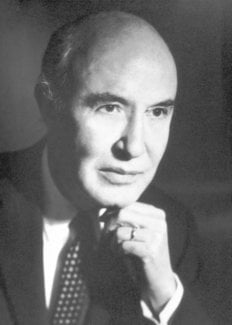Alfonso García Robles
Biographical

Alfonso García Robles was born in Zamora in Mexico in 1911. After studying law he entered his country’s foreign service in 1939. From 1962 to 1964 he held the post of Ambassador to Brazil, and from 1964 to 1970 was State Secretary in the Ministry of Foreign Affairs. From 1971 to 1975 he was Mexico’s permanent representative in the United Nations; in 1975-76 he was Foreign Minister, and since 1977 he has been the Permanent Representative of Mexico to the Committee on Disarmament which has its headquarters in Geneva.
García Robles played a crucial role both in launching and implementing the agreement on a denuclearised zone in Latin America, which was concluded in Tlatelolco on March 12, 1967. He has in fact been called the father of the Tlatelolco Agreement. This, proposed by Adolfo López Mateos, President of Mexico at the time, was the outcome inter alia of the Cuba crisis. The idea was that a ban on nuclear arms would ensure that this part of the world would not be involved in any conflict between rival great powers. Negotiations were conducted by García Robles, and his enterprise and diplomatic skill deserve a large measure of credit for the fact that the agreement was successfully concluded after some years of negotiation. The final goal, however, has still to be reached, as countries such as Brazil and Argentina have signed the agreement but as yet not implemented it.
García Robles has also played a central role in UNO’s work to promote general disarmament. He has represented his country during the negotiations in Geneva, but his name is primarily associated with the special UNO disarmament session. The first special session of this kind was held in 1978, and García Robles was one of the representatives entrusted with the task of coordinating the various views and proposals in a joint document. He was largely responsible for the successful adoption of what is known as the “Final Document” of that session of the Assembly. Though UNO’s next special session in 1982 failed to repeat this success, García Robles received support for his idea of a world disarmament campaign.
This autobiography/biography was written at the time of the award and later published in the book series Les Prix Nobel/ Nobel Lectures/The Nobel Prizes. The information is sometimes updated with an addendum submitted by the Laureate.
| Selected Bibliography |
| By Alfonso García Robles |
| The Denuclearisation of Latin America. New York: Carnegie Endowment for International Peace, 1967. |
| “Mésures de Désarmament dans des Zones Particulières”. In Academy of International Law, The Hague, Recueil des Cours 1971. Vol. 133. Leyden: Sijthoff, 1972, 2: 43-134. |
| Mexico en las Nacionas Unidas. 2 vols. Ciudad Universitaria: Universidad National Autónoma de Mexico, 1970. (Speeches at the United Nations, with introductions.) |
| El Tratado de Tlatelolco. Mexico City: El Colegio de Mexico, 1967. (Speeches and documents.) |
This autobiography/biography was written at the time of the award and first published in the book series Les Prix Nobel. It was later edited and republished in Nobel Lectures. To cite this document, always state the source as shown above.
Alfonso García Robles died on September 2, 1991.
Nobel Prizes and laureates
Six prizes were awarded for achievements that have conferred the greatest benefit to humankind. The 12 laureates' work and discoveries range from proteins' structures and machine learning to fighting for a world free of nuclear weapons.
See them all presented here.
